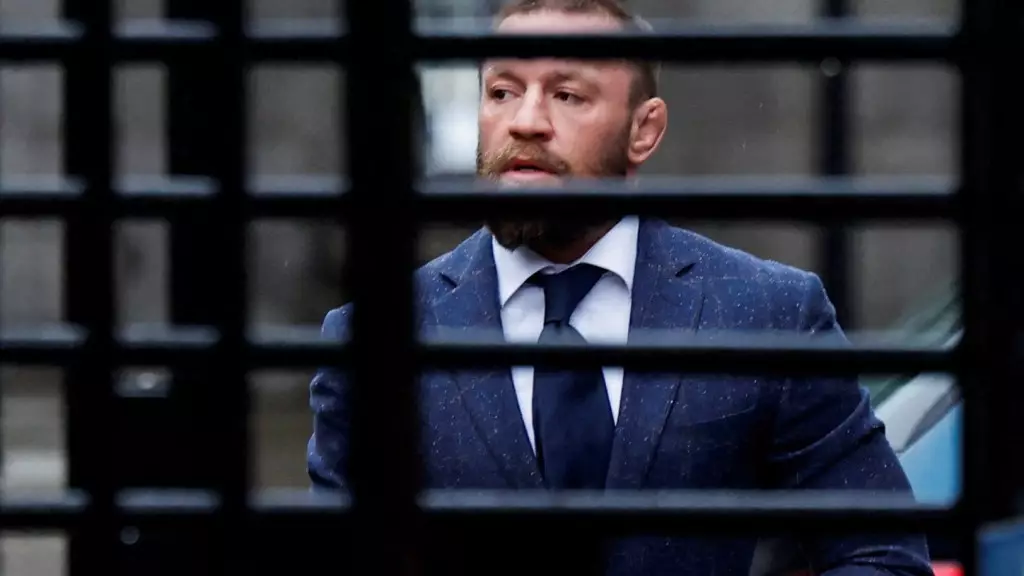Conor McGregor, the once untouchable figure in mixed martial arts and global sports, finds himself grappling with the fallout of serious allegations that have now been reinforced by a jury’s verdict. A recent sexual assault case that resulted in McGregor being found liable has cast a long shadow over his career and personal life. His response, communicated through social media, reflects not only his denial of the charges but also his acknowledgment of personal failings. This article seeks to analyze the implications of McGregor’s situation, the broader cultural context, and the potential ramifications for his future, both within and outside the UFC.
The verdict delivered by the jury in Dublin was, for many, a shocking turn in McGregor’s narrative. After a lengthy 12-day trial, the jury found him liable for sexually assaulting Nikita Hand in December 2018, culminating in a $250,000 damage award to her. This adds a new layer to McGregor’s already tumultuous public persona, as he has been embroiled in multiple controversial incidents throughout his career.
Following the verdict, McGregor expressed regret only for his personal choices, particularly his infidelity toward his long-term partner, Dee Devlin, and the mistakes he claims to have made six years ago. However, his insistence on the consensual nature of the events and the forthcoming appeal paints a picture that is possibly disjointed from public sentiment. The societal implications of such a statement must be examined, as they reveal an ongoing struggle with accountability that extends beyond McGregor as an individual.
McGregor’s case is emblematic of a larger issue within sports culture, where celebrity athletes are often afforded a veil of protection by their fame and wealth. The response from the sports world has been muted, with organizations like the UFC and its president, Dana White, refraining from commenting publicly on the matter. This silence speaks volumes about the delicate balance many organizations attempt to strike between supporting their stars and addressing serious allegations.
In the arena of public perception, the fallout is more pronounced. The removal of McGregor’s character from the successful “Hitman” video game series demonstrates that even brands are beginning to take a firmer stance against figures associated with misconduct. Such actions indicate a shift in consumer expectations around social responsibility, particularly with powerful figures in society.
In his post, McGregor emphasized the role of personal mistakes and the need for accountability in his life. He referenced the deep hurt caused to those closest to him, particularly his family. However, while he takes ownership of his infidelity, he simultaneously distances himself from the accusations leveled against him regarding the assault. This duality illuminates an interesting and troubling aspect of accountability, where one can navigate personal responsibility while still denying allegations that have serious implications for others.
By vowing to appeal the jury’s decision, McGregor positions himself in the ongoing fight for redemption—not only personally but potentially in the public eye as well. His statement shows a desire to return to normalcy, emphasizing his commitment to training and preparing for a comeback in the UFC. Nonetheless, the universal desire for clarity and truth begs the question: can McGregor separate his legacy as an athlete from his personal actions?
As McGregor prepares to move forward, the question remains whether he can rebuild his image after this latest controversy. The verdict against him adds an unprecedented layer of difficulty to any potential comeback. His future in the UFC hinges not just on physical performance but also public acceptance. The mixed responses from fans and sponsors illustrate the complex dynamics of fame and reputation in modern sports.
The narrative surrounding Conor McGregor has taken a turn that few could have anticipated. His case serves as a mirror to society, reflecting the ongoing issues of accountability, consent, and celebrity culture. As he grapples with the consequences of his actions, one must ponder whether a path to redemption is still viable for the notorious fighter, or if the damage to his reputation is irreversible. The coming months will be critical—not just for McGregor but for the broader landscape of sports ethics and personal responsibility.

